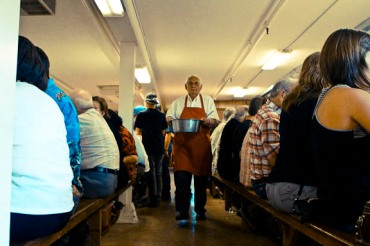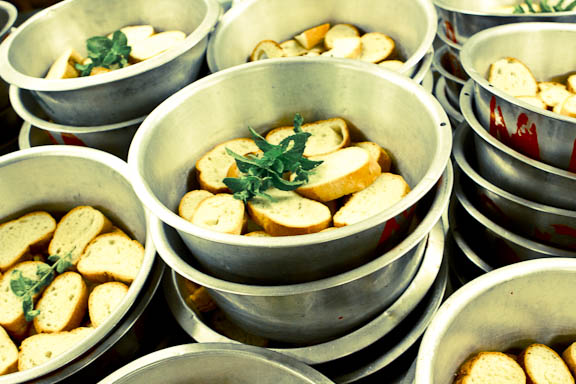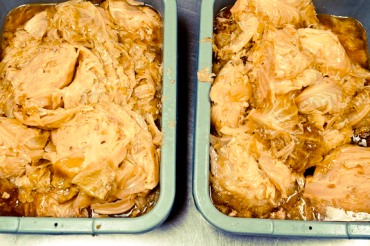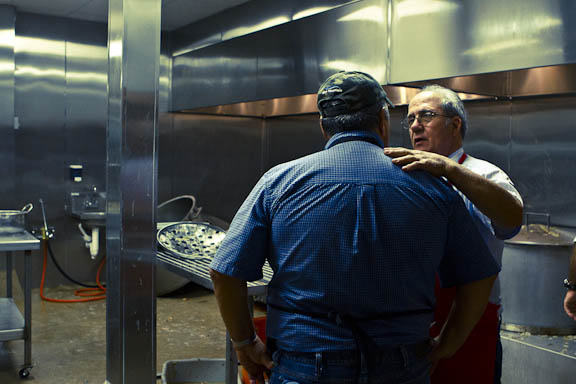Having grown up in the Central Valley of California, the bi-annual Portuguese celebration called festa (also known as Holy Ghost Celebration) was always something that I was aware of, but only attended a couple of times when I was lucky enough to get invited as a guest by a Portuguese friend. As a child, I remember parties that lasted into the wee hours of the night, beautifully adorned women wearing elaborate crowns and sparkly dresses, and of course the food. I can still remember the local community hall filled with men in cowboy boots and large hats lining up for the feast piled high on the long tables. Festa is such a spectacular (but fairly unknown) event, and I was very much looking forward to attending again as an adult and sharing it with the America Eats community.
The festa celebration involves many traditions including parades, feasts, candlelight processions, the crowning of festa queens, and concludes dramatically with a bloodless bullfight. My focus, however, was on the sopa! Although sopa is just a very simple soup-like dish, it embodies the spirit of the entire celebration. When Portuguese people immigrated to the U.S. (mainly the Central Valley of California, San Diego, and the New York area) they brought many of their customs and traditions. Among those traditions was festa. The story of its origins go like this… (appropriated from flyer about the festivities)
It all began hundreds of years ago in 1296 when Queen Isabel of Agagao, wife of King Diniz of Portugal, saw her subjects suffering from the effects of a devastating drought followed by a long famine. Thousands of people died during those years. Wells ran dry, and food began to get scarce.
Portugal’s Queen Isabel did all she could for her people during that time. There is a tradition that shows her, always with red roses in one hand and a small loaf of bread in the other. This stems from her habit of taking bread from the palace and secretly passing it to the poor and hungry. One day the king found out about it and confronted her. When she opened her apron to reveal the stolen bread, a miracle had occurred. For instead of bread, a bunch of red roses fell to the floor. Her generosity and love for her people had been honored by God.
Masses were said continuously during a nine-day novena until the day of Pentecost when the people witnessed three ships sail up the harbor and docked in Lisbon. These ships were filled with grain. Their hunger was finally at an end. It also began to rain, after several years of drought. This was considered to be a major miracle.
In thanksgiving to the Holy Spirit for this miraculous deliverance, the day of the Pentecost was declared to be a national holiday. This holiday persisted in Portugal for several centuries before being exported to the Azores Islands, and onto our community in Modesto.
When Portuguese people migrated to California and the East Coast, they brought the Holy Ghost Celebration with them, introducing it to their American neighbors. Queen Isabel was canonized by Pope Urban the Eighth in 1625. Her devotion to her people was symbolized by the promise she made to the Holy Spirit that if her people were delivered from the famine and drought, she would lay her jeweled crown on the altar as a gift to the church.

Father Francisco Dimiz (shown on right) from Lisbon, Portugal enjoys a piece of fresh bread and butter before the sopa was served. Dimiz came to Modesto to bless the sopa and take part in the celebration.
In order to honor Queen Isabel’s generosity, the community makes sopa for three meals a day, for duration of the festa weekend–Friday through Sunday. These meals are provided for free to everyone who wants to attend. On the day I was there the local Portuguese-American association served over 5,000 people throughout the course of the day.
The atmosphere in the hall was lively and jovial. The cooks were all men who clearly had sopa running through their veins. This is a tradition that they have all grown up with and something they look forward to all year long. The kitchen was thick with the smell of cabbage and beef and was as sweltering as a southern summer day. Portuguese was the dominant language spoken in the room, and a healthy dose of red wine was being passed around the kitchen. The men had all been preparing for and cooking the meal for over a week, and yet they were in amazing spirits and incredibly happy to be providing this service to the community.
So what is sopa exactly? When I asked one of the cooks what the ingredients were, he laughed and said to me, “you know, cabbage, water, beef.” When I pressed further for what exactly was included in the soup, he just smiled and claimed that that’s all there was to it. Upon further investigation I found a recipe that seems pretty close to the actual ingredients I saw in the kitchen.
Ingredients:
Water
4 tbsp. pickling spice
Soup meat (any kind of meat, usually beef)
4 cloves garlic, minced
Salt to taste
Pepper to taste
3 (8 oz. each) cans tomato sauce
1 head cabbage
1 loaf French bread
Fresh mint
The Process:
In tea strainer boil pickling spices along with soup meat (cut into small pieces), garlic, salt, pepper and tomato sauce. Simmer 3 hours. Before you serve, boil cabbage (cut in 1/8ths) and drain. Slice bread and sprinkle with very little of cinnamon. In bowls – layer bread, cabbage, sopas, and top with mint. Makes a lot.
Festas happen in many cities throughout America, predominately in May/June and December/January. They are not widely publicized, however the events are open to the public. Being non-Portuguese myself, I felt welcomed with open arms and I would suggest that everyone attend a festa if you have the opportunity. It’s a great place for families to come together and reconnect. Here are the best resources I found to locate details about when and where festas are taking place.








